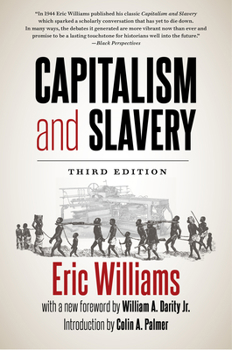Capitalism and Slavery, Third Edition
Select Format
Select Condition 
Book Overview
Slavery helped finance the Industrial Revolution in England. Plantation owners, shipbuilders, and merchants connected with the slave trade accumulated vast fortunes that established banks and heavy industry in Europe and expanded the reach of capitalism worldwide. Eric Williams advanced these powerful ideas in Capitalism and Slavery, published in 1944. Years ahead of its time, his profound critique became the foundation for studies of imperialism...
Format:Paperback
Language:English
ISBN:1469663686
ISBN13:9781469663685
Release Date:April 2021
Publisher:University of North Carolina Press
Length:272 Pages
Weight:0.85 lbs.
Dimensions:0.6" x 6.1" x 9.2"
Customer Reviews
4 ratings
Capitalism and Slavery is definitely food for the brain.
Published by Thriftbooks.com User , 18 years ago
This is a very, very excellent piece of work. I read and studied this book when I was a teenager in high school in Trinidad. At that time I was required to study the book as part of our Caribbean History syllabus. That was over 13 years ago. So as an adult I decided to purchase the book and appreciate the information. And boy this was the best decision I ever made. I recommend people of all races and backgrounds to read this book. As the first Prime Minister of Trinidad and Tobago Dr. Eric Williams has left us with a gift.
A wonderful thesis withstanding the tests of time
Published by Thriftbooks.com User , 18 years ago
I recently read this book for graduate school and highly recommend it. This book was written in 1940 and while critics have been able to pick at a few details within the book, noone has every successfully disproven his entire thesis - that the rise of industrial capitalism would not have been possible without the existence profits derived from slavery and the slave trade. Williams does a splended job of illustrating how slavery influenced all facets of the triangular trade, which in turn shaped Britian into an economic power. It also brings put the economic reasons for the abolitionist movement (namely, that abolitionists were motivated by free-trade, no necessarily compassion in their opposition to the slave trade).This is a must-have book for anyone interested in a strictly economic look at slavery, it's rise, fall and demise.
Misunderstanding of Islamic slavery
Published by Thriftbooks.com User , 19 years ago
The last two reviewers who seemed to criticize Williams for not discussing other forms of slavery miss the point. Williams was not engaged in some sort of West bashing but attempted to explain the significance of slavery in the development of the Caribbean. Insofar as Islam is concerned, the reviewers once again miss the essential point. Rather than investigate what Islam actually says about slavery they go with a knee-jerk assumption. Here is what Kecia Ali has written about slavery in Islamic society: "The Qur'an, which Muslims believe to have been revealed by God to the Prophet Muhammad in the seventh century, makes numerous references to slaves and slavery (e.g., Q. 2.178; 16.75; 30.28). Like numerous passages in the Hebrew bible and the New Testament, the Qur'an assumes the permissibility of owning slaves, which was an established practice before its revelation. The Qur'an does not explicitly condemn slavery or attempt to abolish it. Nonetheless, it does provide a number of regulations designed to ameliorate the situation of slaves. It recommends freeing slaves, especially "believing" slaves (Q. 2.177). Manumission of a slave is required as expiation for certain misdeeds (Q. 4.92; 58.3) and another verse states that masters should allow slaves to purchase their own freedom (Q. 24.33). The Qur'an also suggests certain means of integrating slaves, some of whom were enslaved after being captured in war, into the Muslim community. It allows slaves to marry (either other slaves or free persons; Q. 24.32; 2.221; 4.25) and prohibits owners from prostituting unwilling female slaves (Q. 24.33). Despite this protection against one form of sexual exploitation, female slaves do not have the right to grant or deny sexual access to themselves. Instead, the Qur'an permits men to have sexual access to "what their right hands possess," meaning female captives or slaves (Q. 23.5-6; 70.29-30). This was widely accepted and practiced among early Muslims; the Prophet Muhammad, for example, kept a slave-concubine (Mariya the Copt) who was given to him as a gift by the Roman governor of Alexandria. Traditional Islamic law (fiqh) elaborates significantly on the Qur'anic material concerning slavery. The enslavement of war captives is regulated, along with the purchase and sale of slaves. While it is not permissible to enslave other Muslims, the jurists clarify that if a non-Muslim converts to Islam after enslavement, he or she remains a slave and may be lawfully purchased and sold like any other slave. (This rule closes a potential loophole allowing for slaves to gain their freedom by the simple fact of conversion.) The law also prescribes penalties for slave owners who maltreat or abuse their slaves; these penalties can include forced manumission of the slave without compensation to the owner. Islamic law devotes special attention to regulating the practice of slave marriage and concubinage, in order to determine the paternity and/or ownership of children bo
Caribbean History
Published by Thriftbooks.com User , 19 years ago
Although there may be complainants about Dr. Williams not addressing certain forms of slavery throughout history it has to be kept in mind that his thesis was about the hows and whys of African enslavement in the Caribbean. Williams firmly argues and details how today's culture of racism and capitalism was born. This book is extremely well done and a great beginner for anyone interested in the topic of Caribbean history.





